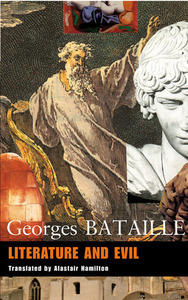Take a photo of a barcode or cover
reflective
fast-paced
"Turmoil is fundamental to my entire study; it is the very essence of my book."
An underrated quote. Bataille's writing (or should I say, his thesis) is so complex that I'm left amazed and humbled (and yes, fine, also confused). His mind operates on a very unique plane; some of his thoughts hit at some instinctive root in me and some of them fly right over my head. This definitely calls for a future reread. Regardless, it's clear this is not at all intended as a literary analysis and more of an expression of philosophical thought, so I think all the other reviews saying that this novel failed as a literary analysis completely missed the point. It's more that each author was an aide in Bataille's exploration of the concept of "evil" in literature, and not just that, but also many things - childhood, divinity, passion, love, life, death, humanity, truth, lies, and arguably, the nature of what it means to be a writer. And yes, morality too, though not the traditional definition of the world. No one can say Bataille is boring.
Of all the authors discussed, I've only read Emily Brontë and Marcel Proust's work, so until I read the other writers featured, I could only really gain insight from the chapters written on these two authors. Nonetheless, I enjoyed reading Bataille's views on how evil (in his mind, and in the context of a philosophical approach to literature) is defined as an act performed for no reason other than its own sake, rather than to achieve something else. An easy example is a murder performed for the sake of it rather than for money (I'm looking at you, Dostoevsky's Crime and Punishment); the former is what Bataille would consider evil and the latter, not.
Even before reading this book, I was thinking a lot about the act of writing, because I'm that sort of dreadful person who feels perpetually guilty about everything and anything, so reading this now was very well-timed. A fact: to write literature is to create. Is it a justified use of time and publishing effort to create merely for pure enjoyment, or should there be a higher purpose? In other words, should we always write for a reason? I don't know if I'm off on a tangent and if he would be cross at me for that, but regardless, I do think he answered my questions himself in his preface: "Literature is either the essential or nothing." Literature should strike at the essence of us or it's worth nothing. And to do so requires necessitates humanity; it necessitates evil (or shall I say, freedom) even while we instinctively strive for good. So literature is inherently guilty, and it should be honest about it, which is where integrity and loyalty comes in.
To end with my favourite quote from the book, because I am, have always and will always be dreadfully in love with deathly love:
"For though Emily Brontë, despite her beauty, appears to have had no experience of love, she had an anguished knowledge of passion. She had the sort of knowledge which links love not only with clarity, but also with violence and death – because death seems to be the truth of love, just as love is the truth of death."
An underrated quote. Bataille's writing (or should I say, his thesis) is so complex that I'm left amazed and humbled (and yes, fine, also confused). His mind operates on a very unique plane; some of his thoughts hit at some instinctive root in me and some of them fly right over my head. This definitely calls for a future reread. Regardless, it's clear this is not at all intended as a literary analysis and more of an expression of philosophical thought, so I think all the other reviews saying that this novel failed as a literary analysis completely missed the point. It's more that each author was an aide in Bataille's exploration of the concept of "evil" in literature, and not just that, but also many things - childhood, divinity, passion, love, life, death, humanity, truth, lies, and arguably, the nature of what it means to be a writer. And yes, morality too, though not the traditional definition of the world. No one can say Bataille is boring.
Of all the authors discussed, I've only read Emily Brontë and Marcel Proust's work, so until I read the other writers featured, I could only really gain insight from the chapters written on these two authors. Nonetheless, I enjoyed reading Bataille's views on how evil (in his mind, and in the context of a philosophical approach to literature) is defined as an act performed for no reason other than its own sake, rather than to achieve something else. An easy example is a murder performed for the sake of it rather than for money (I'm looking at you, Dostoevsky's Crime and Punishment); the former is what Bataille would consider evil and the latter, not.
Even before reading this book, I was thinking a lot about the act of writing, because I'm that sort of dreadful person who feels perpetually guilty about everything and anything, so reading this now was very well-timed. A fact: to write literature is to create. Is it a justified use of time and publishing effort to create merely for pure enjoyment, or should there be a higher purpose? In other words, should we always write for a reason? I don't know if I'm off on a tangent and if he would be cross at me for that, but regardless, I do think he answered my questions himself in his preface: "Literature is either the essential or nothing." Literature should strike at the essence of us or it's worth nothing. And to do so requires necessitates humanity; it necessitates evil (or shall I say, freedom) even while we instinctively strive for good. So literature is inherently guilty, and it should be honest about it, which is where integrity and loyalty comes in.
To end with my favourite quote from the book, because I am, have always and will always be dreadfully in love with deathly love:
"For though Emily Brontë, despite her beauty, appears to have had no experience of love, she had an anguished knowledge of passion. She had the sort of knowledge which links love not only with clarity, but also with violence and death – because death seems to be the truth of love, just as love is the truth of death."
challenging
reflective
fast-paced
challenging
informative
reflective
slow-paced
this is not a literary investigation per se. Bataille is more interested in the individual behind the literary text, and how this evilness reflects in the writing of literature. I completely agree with Bataille in one specific point: that literature without evil would be (and is) freaking boring. Have you imagined a novel/poem/drama without conflict (and a conflict whose basis is in evil)? BORING. Literature deals with things gone horribly wrong, its core is the exploration of anguish, loneliness, death. According to Bataille, good literary writing is a sort of disobedience, it shows the rotness we have inside and when confronted with it something in us stirs up. Of course, the ending of a literary text can present us with redemption, with the solution of the conflict. But, what sets literature out is, essentially, evil.
"La literatura no es inocente y, como tal, tenía que declararse culpable".
Así abre este libro de ensayos George Bataille, escritor francés, al que leo por primera vez. Desde que vi el título de este libro en El Péndulo, tuve inquietud por leerlo. Merodé en diversas ocasiones la sección en la que libro se encontraba, toda vez que el ejemplar tenía un precio alto para mis estándares. Sin embargo, pudo más el interés que mi prudencia financiera, así que lo adquirí.
He de confesar que tardé un par de meses en leerlo, y confesar también que la lectura inicial me pareció sumamente complicada. Yo pensaba haber comprado un libro de ensayos literarios, y al encontrarme con el primero sobre Emily Brontë y Cumbres Borrascosas, por un instante pensé que me había equivocado. Parecía más un libro de filosofía, y para rematar con una última confesión, odio la filosofía (odiar es extremo, más bien es un tema que no suelo leer).
Por un momento pensé en abandonar la empresa. No entendía muchas cosas. Sin embargo, Bataille nos introduce en el tema, sobre la representación del mal a través de la literatura.
Aún estoy digiriendo el contenido de los ensayos. No obstante, he adquirido una nueva perspectiva de autores como Kafka, Sade y Bauldelaire, e incluso me interesado por la obra de Michelet. Además, me urge volver a releer a Brontë.
¿Por qué estos autores están vinculados al mal? Creo entender que se debe a que buscaron ir más allá de los límites, más allá de lo social y moralmente aceptable. La literatura fue su conducto porque la literatura no tiene límite (o no debería tenerlo, como medio de expresión). Y en una sociedad como la nuestra, la moral es cuestión de límites. Esta declaración nos obliga a plantearnos, ¿entonces el bien tiene un límite, nos pone límites? Si los transgredimos entonces estamos en la zona del mal, pero un mal consciente del bien.
Esto es lo que Bataille plantea. Y lo hace de una manera complicada sí, pero al mismo tiempo extraordinaria.
Lecturas como ésta me aterrizan nuevamente en lo que es la fuerza de la literatura.
Así abre este libro de ensayos George Bataille, escritor francés, al que leo por primera vez. Desde que vi el título de este libro en El Péndulo, tuve inquietud por leerlo. Merodé en diversas ocasiones la sección en la que libro se encontraba, toda vez que el ejemplar tenía un precio alto para mis estándares. Sin embargo, pudo más el interés que mi prudencia financiera, así que lo adquirí.
He de confesar que tardé un par de meses en leerlo, y confesar también que la lectura inicial me pareció sumamente complicada. Yo pensaba haber comprado un libro de ensayos literarios, y al encontrarme con el primero sobre Emily Brontë y Cumbres Borrascosas, por un instante pensé que me había equivocado. Parecía más un libro de filosofía, y para rematar con una última confesión, odio la filosofía (odiar es extremo, más bien es un tema que no suelo leer).
Por un momento pensé en abandonar la empresa. No entendía muchas cosas. Sin embargo, Bataille nos introduce en el tema, sobre la representación del mal a través de la literatura.
Aún estoy digiriendo el contenido de los ensayos. No obstante, he adquirido una nueva perspectiva de autores como Kafka, Sade y Bauldelaire, e incluso me interesado por la obra de Michelet. Además, me urge volver a releer a Brontë.
¿Por qué estos autores están vinculados al mal? Creo entender que se debe a que buscaron ir más allá de los límites, más allá de lo social y moralmente aceptable. La literatura fue su conducto porque la literatura no tiene límite (o no debería tenerlo, como medio de expresión). Y en una sociedad como la nuestra, la moral es cuestión de límites. Esta declaración nos obliga a plantearnos, ¿entonces el bien tiene un límite, nos pone límites? Si los transgredimos entonces estamos en la zona del mal, pero un mal consciente del bien.
Esto es lo que Bataille plantea. Y lo hace de una manera complicada sí, pero al mismo tiempo extraordinaria.
Lecturas como ésta me aterrizan nuevamente en lo que es la fuerza de la literatura.





